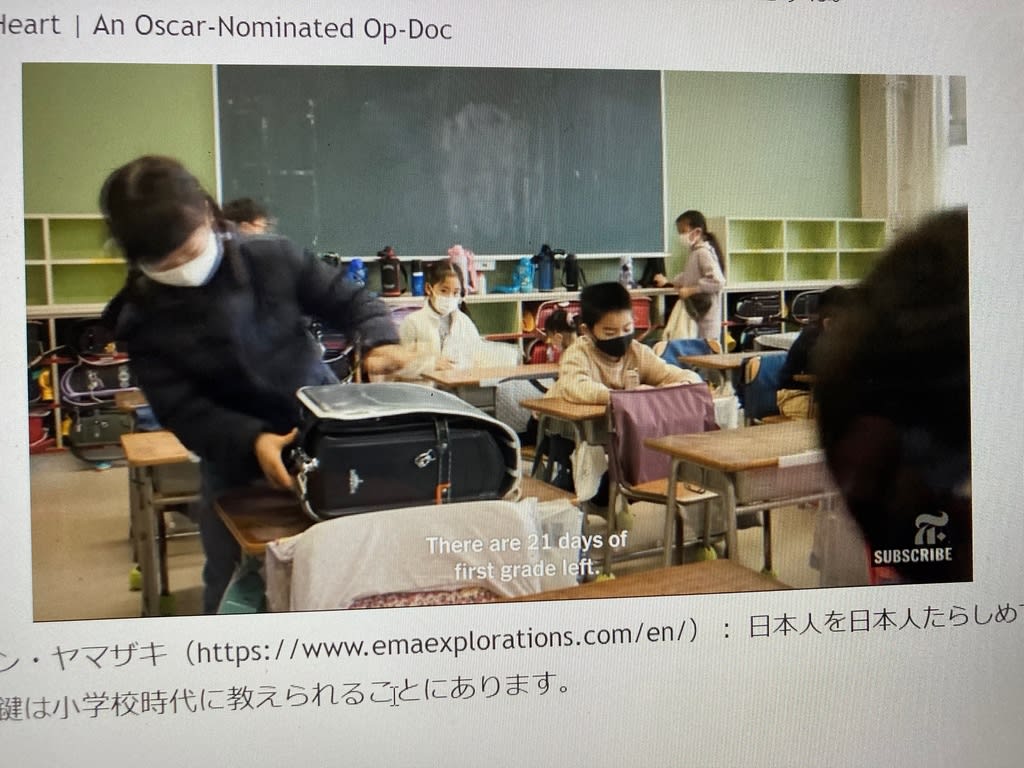
とても興味深いドキュメントです。小学生たちのリアルな協力していく姿が微笑ましいですね。
(以下の動画は英語字幕がついています。削除されるかもしれません。)
Instruments of a Beating Heart | An Oscar-Nominated Op-Doc
映画・文:エマ・ライアン・ヤマザキ(https://www.emaexplorations.com/en/):
日本人を日本人たらしめているものは何でしょうか?私にとって、その鍵は小学校時代に教えられることにあります。
What makes Japanese people distinctively Japanese? For me, the key lies in what we are taught during our elementary school years.
What makes Japanese people distinctively Japanese? For me, the key lies in what we are taught during our elementary school years.
6歳の子どもたちは、自分たちの教室を掃除し、給食を配膳する責任を与えられます。学校はミニ社会のような構造で、誰もが役割を持ち、地域社会に貢献することが期待されている。チームワーク、労働倫理、達成感を教えることを目的とした学業以外の教育にも重点が置かれている。
Children as young as 6 are responsible for cleaning their classrooms and serving one another lunch. Schools are structured like mini societies, where everyone has a role and is expected to contribute to the community. There’s a strong focus on nonacademic education intended to teach teamwork, work ethic, and a sense of accomplishment.
日本人の母とイギリス人の父を持つ子供として日本で育った私は、自分のアイデンティティについて悩んだ。小学校教育で教え込まれた価値観や労働倫理に感謝するようになったのは、数年後、海外で生活していたときだった。これらの特徴は、日本社会がそのように機能している理由にも貢献している: 電車が時間通りに運行するのは、調和と他者への配慮を優先するよう教えられているからである。一方、私たちは集団的なプレッシャーのもとで、自分たちのコミュニティに恥をかかせないよう適合して生きている。
Growing up in Japan as the child of a Japanese mother and a British father, I struggled with my identity. It was only years later when I was living abroad that I came to appreciate the values and work ethic instilled in me by my elementary school education; they are so normalized in Japan that their worth is underappreciated. These traits also contribute to why Japanese society works the way it does: Our trains run on time because we are taught to prioritize harmony and consideration for others; on the other hand, we live under a collective pressure to conform and not disgrace our community.
2022年に撮影された上記の短編ドキュメンタリー『鼓動の楽器』では、東京の公立学校の1年生が、最後の学期にオーケストラを結成し、学校の式典で演奏するという課題を提示される。子どもたちは「心をひとつに」と教えられ、厳しいリハーサルを行う。集団に責任を負わされることの重圧と不思議の両方を目の当たりにする。
In the short documentary above, “Instruments of a Beating Heart,” filmed in 2022, first graders at a Tokyo public school are presented with a challenge for their final semester: to form an orchestra and perform at a school ceremony. As the children are taught to “make your hearts as one” and rigorously rehearse,
we see both the pressures and the wonders of being held responsible for a group.
DeepL.com(無料版)で翻訳しました。
Growing up in Japan as the child of a Japanese mother and a British father, I struggled with my identity. It was only years later when I was living abroad that I came to appreciate the values and work ethic instilled in me by my elementary school education; they are so normalized in Japan that their worth is underappreciated. These traits also contribute to why Japanese society works the way it does: Our trains run on time because we are taught to prioritize harmony and consideration for others; on the other hand, we live under a collective pressure to conform and not disgrace our community.
2022年に撮影された上記の短編ドキュメンタリー『鼓動の楽器』では、東京の公立学校の1年生が、最後の学期にオーケストラを結成し、学校の式典で演奏するという課題を提示される。子どもたちは「心をひとつに」と教えられ、厳しいリハーサルを行う。集団に責任を負わされることの重圧と不思議の両方を目の当たりにする。
In the short documentary above, “Instruments of a Beating Heart,” filmed in 2022, first graders at a Tokyo public school are presented with a challenge for their final semester: to form an orchestra and perform at a school ceremony. As the children are taught to “make your hearts as one” and rigorously rehearse,
we see both the pressures and the wonders of being held responsible for a group.
DeepL.com(無料版)で翻訳しました。
820,965 回視聴 2024/11/24
Film and text by Ema Ryan Yamazaki (https://www.emaexplorations.com/en/):
More from The New York Times Video: Op-Docs: https://www.nytimes.com/column/op-docs Subscribe: http://bit.ly/U8Ys7n Watch all of our videos here: http://nytimes.com/video ---------- Op-Docs is a forum for short, opinionated documentaries by independent filmmakers. Learn more about Op-Docs and how to submit to the series. Follow The New York Times Opinion section on Facebook, Twitter, and Instagram (@NYTopinion).



















